
JOURNAL OF MULTIPLE-VALUED LOGIC AND SOFT COMPUTING
Scope & Guideline
Fostering Collaboration in Logic and Computation.
Introduction
Aims and Scopes
- Multiple-Valued Logic:
The journal extensively covers advancements in multiple-valued logic systems, exploring their properties, applications, and implications in various domains, including computer science and mathematics. - Fuzzy Logic and Soft Computing:
A core area of the journal is the study of fuzzy logic and soft computing techniques, emphasizing their application in decision-making processes, optimization problems, and uncertainty modeling. - Multi-Criteria Decision Making (MCDM):
The journal frequently publishes research on MCDM methodologies, integrating fuzzy and multiple-valued logic approaches to solve complex decision-making problems across various fields such as engineering, economics, and environmental science. - Applications in Real-World Problems:
A significant focus is placed on practical applications, including risk assessment, project prioritization, and resource management, demonstrating the utility of multiple-valued logic and soft computing in solving contemporary challenges. - Interdisciplinary Approaches:
The journal encourages interdisciplinary research that combines elements of mathematics, computer science, artificial intelligence, and engineering, highlighting the versatility of multiple-valued logic and soft computing in diverse areas.
Trending and Emerging
- Hybrid and Advanced Fuzzy Models:
There is a growing interest in hybrid fuzzy models that combine multiple fuzzy approaches, such as interval-valued fuzzy sets and intuitionistic fuzzy sets, to enhance decision-making processes. - Applications of Artificial Intelligence (AI):
The integration of AI with fuzzy logic and soft computing methodologies is increasingly prevalent, particularly in areas like machine learning, predictive analytics, and automated decision-making. - Sustainability and Environmental Applications:
Research focused on sustainable practices and environmental decision-making using fuzzy and multiple-valued logic is on the rise, reflecting global priorities around sustainability. - Data-Driven Decision Making:
The trend towards data-driven methodologies, particularly in the context of big data and data mining applications, is becoming more prominent, showcasing the need for adaptive and intelligent decision-making frameworks. - Complex Systems and Optimization Problems:
Emerging themes include the application of multiple-valued logic in complex systems and optimization problems, highlighting the journal's engagement with contemporary challenges in various industries.
Declining or Waning
- Traditional Fuzzy Set Theory:
There has been a noticeable decrease in papers exclusively focused on traditional fuzzy set theory, as researchers increasingly explore more complex and hybrid models that incorporate intuitionistic and picture fuzzy sets. - Basic Algebraic Structures:
Papers focusing solely on basic algebraic structures without applications or connections to fuzzy logic or soft computing have become less common. The trend now favors research that integrates these structures with practical applications. - Purely Theoretical Constructs:
Research that is purely theoretical, lacking empirical applications or real-world relevance, appears to be declining. The journal's recent publications lean towards studies that demonstrate practical implications of theoretical concepts.
Similar Journals
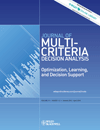
Journal of Multi-Criteria Decision Analysis
Empowering Practitioners with Groundbreaking ResearchThe Journal of Multi-Criteria Decision Analysis (JMCDM) is a distinguished academic publication dedicated to the interdisciplinary field of decision sciences and management strategies. Published by WILEY, this journal has been a vital resource for researchers and practitioners looking to enhance their understanding of complex decision-making processes since its inception in 1992. The journal is recognized for its rigorous peer-review process and currently holds a Q3 ranking in Decision Sciences (miscellaneous) and a Q2 ranking in Strategy and Management, highlighting its significant contributions to the field. With impressive Scopus rankings, including Rank #19 in General Decision Sciences, JMCDM provides a platform for innovative research that influences theory and practice alike. Although not completely open access, it maintains a robust electronic presence through its E-ISSN: 1099-1360. Researchers, professionals, and students can expect to find comprehensive analyses, methodological advancements, and diverse case studies that support informed decision-making in a variety of contexts.

Journal of Applied Mathematics & Informatics
Transforming Ideas into Algorithms: Where Mathematics Meets Informatics.Journal of Applied Mathematics & Informatics is a peer-reviewed academic journal published by the Korean Society of Computational & Applied Mathematics (KSCAM), focusing on the integration and application of mathematical theories and computational techniques across various domains. Established in 2019, this journal serves as a platform for researchers, professionals, and students to share innovative methodologies, practical applications, and theoretical advancements in fields like analysis, applied mathematics, and computational theory. As a Q4 ranked journal according to the 2023 category quartiles in analysis, applied mathematics, computational mathematics, and miscellaneous mathematics, it provides a valuable, albeit niche, contribution to the academic landscape. While the journal currently operates without open access options, it aims to disseminate quality research to foster collaboration and knowledge exchange within the mathematics and computer science communities. Researchers looking to explore emerging trends and methodologies in applied mathematics and informatics will find an essential resource in this journal, which is based in Daejeon, South Korea.
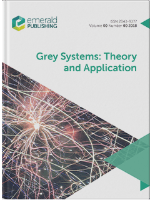
Grey Systems-Theory and Application
Navigating Complexity: Insights from Grey Systems ResearchGrey Systems - Theory and Application is a premier journal dedicated to advancing the field of grey systems theory, which plays a pivotal role in addressing uncertainties in complex systems across various domains. Published by Emerald Group Publishing Ltd in the United Kingdom, this journal has established itself as a respected platform for innovative research, boasting a commendable 2023 impact factor reflected in its Q2 categorization in applied mathematics, computer science, and control systems engineering. With Scopus rankings placing it in the top tiers of its fields, it provides a robust forum for researchers, professionals, and students to explore theoretical developments and practical applications. The journal, which has been converged from 2011 to 2024, encourages open conversations on the theoretical underpinnings and real-world implications of grey systems, making it an essential resource for those looking to deepen their understanding and contribute meaningfully to this dynamic area of study.

Operations Research and Decisions
Empowering Decisions Through Innovative ResearchOperations Research and Decisions is a highly accessible, peer-reviewed journal published by Wroclaw University of Science and Technology, Faculty of Management. Established in Poland, this open access journal has been disseminating cutting-edge research since 2010 and focuses on the vital intersection of operations research and decision-making processes. With an ISSN of 2081-8858 and an E-ISSN of 2391-6060, it serves as a platform for both theoretical advancements and practical applications in various fields, including management science, modeling and simulation, and statistics. Although currently categorized in the Q4 quartile in multiple relevant subject areas in 2023, the journal is committed to promoting innovative research that addresses contemporary challenges in technology and decision sciences. Researchers, professionals, and students alike will find valuable insights within its pages as they contribute to the evolving landscape of operations research. The journal is available for all interested readers, ensuring that knowledge is freely shared and disseminated across the globe.
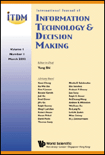
INTERNATIONAL JOURNAL OF INFORMATION TECHNOLOGY & DECISION MAKING
Elevating Decision-Making Through Cutting-Edge IT ResearchINTERNATIONAL JOURNAL OF INFORMATION TECHNOLOGY & DECISION MAKING, published by WORLD SCIENTIFIC PUBL CO PTE LTD, stands as a premier platform in the realm of computer science, focusing particularly on the intersection of information technology and decision sciences. Established in 2002, the journal has consistently published high-quality research, now recognized as a Q1 journal in Computer Science (miscellaneous) as of 2023, ranking 15th out of 133 in its category, which underscores its excellence and influence in the field. Although it does not currently offer Open Access options, the journal remains accessible to a broad audience of researchers, professionals, and students who seek to enhance their understanding of innovative decision-making methodologies powered by information technology. With an emphasis on interdisciplinary collaboration, this journal is dedicated to advancing theoretical and practical knowledge, making it an essential resource for anyone looking to stay at the forefront of technology-driven decision-making processes.

Fuzzy Optimization and Decision Making
Transforming Decision Making with Cutting-Edge Fuzzy TechniquesFuzzy Optimization and Decision Making, published by Springer, is a prestigious academic journal that has made significant contributions to the fields of Artificial Intelligence, Logic, and Software. With an impressive impact factor and a consistent ranking in the top Q1 quartile across its categories, this journal stands at the forefront of research dissemination in its domain. Established in 2002 and continuing through 2024, the journal focuses on the theoretical and practical aspects of fuzzy optimization methods and their applications in decision-making scenarios. The journal is highly regarded for its rigorous peer-review process and aims to present innovative research findings that inspire advancements in optimization techniques using fuzzy logic. Aimed at researchers, professionals, and students alike, Fuzzy Optimization and Decision Making serves as an essential resource for those looking to stay at the cutting edge of technology and methodology in mathematics and computer science.
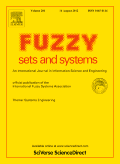
FUZZY SETS AND SYSTEMS
Pioneering Research in Fuzzy Logic ApplicationsFuzzy Sets and Systems, published by Elsevier, is a leading international journal that delves into the intricate field of fuzzy logic and its applications in various domains, including artificial intelligence and computational mathematics. With a significant impact within its categories—ranking Q2 in Artificial Intelligence and Q1 in Logic for 2023—this journal offers a robust platform for scholars to share cutting-edge research and developments. Focusing on the application of fuzzy set theory to enhance decision-making processes, modeling, and data analysis, it caters to a diverse audience of researchers, industry professionals, and advanced students. The journal's rigorous review process and prestigious ranking, evidenced by its impressive Scopus metrics—2nd in Mathematics & Logic and 120th in Computer Science—underscore its importance in the academic landscape. Contributors are encouraged to explore innovative methodologies, theoretical advancements, and interdisciplinary approaches. Fuzzy Sets and Systems continues to serve as a vital resource for advancing knowledge and fostering collaboration within the fuzzy logic community.
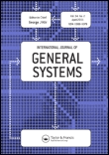
INTERNATIONAL JOURNAL OF GENERAL SYSTEMS
Innovating Research on General Systems since 1974The INTERNATIONAL JOURNAL OF GENERAL SYSTEMS, published by TAYLOR & FRANCIS LTD, is a prestigious peer-reviewed journal dedicated to advancing the fields of systems theory and its applications across a variety of scientific disciplines. With an ISSN of 0308-1079 and an E-ISSN of 1563-5104, this journal has carved a niche since its inception in 1974, continuing to provide a platform for innovative research through to 2024. Featured in the esteemed Q2 category in multiple domains, including Computer Science Applications, Control and Systems Engineering, and Information Systems, it serves as a vital resource for the scientific community, fostering interdisciplinary collaboration. The journal's rankings in Scopus reflect its quality, with noteworthy positions in fields such as Mathematics, Engineering, and Theoretical Computer Science. While access is through subscription, the journal remains an essential conduit for researchers, professionals, and students eager to deepen their understanding of general systems and their complex interactions within various environments.

Axioms
Advancing Mathematical Frontiers with Open Access.Axioms is a distinguished open-access journal published by MDPI since 2012, dedicated to the field of mathematics. Based in Switzerland, it serves as a platform for the dissemination of high-quality research across various domains including Algebra, Number Theory, Analysis, Geometry, Topology, Logic, and Mathematical Physics. With an impressive Q3 ranking across multiple categories in the 2022 classification, Axioms maintains a robust presence in the academic community, reflected in its Scopus rankings which position it favorably within the top percentiles of its respective fields. The journal aims to facilitate open and rapid access to groundbreaking theoretical advancements and practical applications, making it an invaluable resource for researchers, professionals, and students alike. Researchers are encouraged to contribute their findings to foster innovative discussions and collaborations in the mathematical sciences.

TWMS Journal of Applied and Engineering Mathematics
Advancing Mathematical Innovation for a Global AudienceTWMS Journal of Applied and Engineering Mathematics, published by TURKIC WORLD MATHEMATICAL SOC, is a distinguished open-access journal that has been contributing to the field of applied mathematics since 2011. With a focus on theoretical and practical applications spanning various areas including Computational Mathematics, Control and Optimization, and Numerical Analysis, this journal serves as a vital resource for researchers and professionals looking to disseminate and access quality research. Although currently positioned in the Q4 quartile across several mathematical categories in 2023, the journal aims to provide a platform for innovative research, fostering collaboration and knowledge sharing among scholars worldwide. Located in Turkey, this journal emphasizes accessible content, inviting a diverse audience to explore breakthroughs and advancements in mathematical sciences. With its broad spectrum of topics, TWMS Journal not only enriches academic discourse but also plays a crucial role in supporting the development of new methodologies and technologies in engineering and applied mathematics.